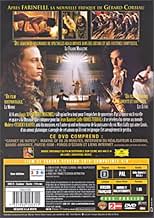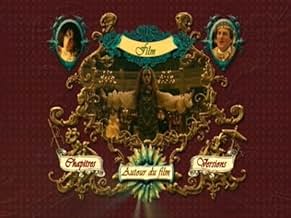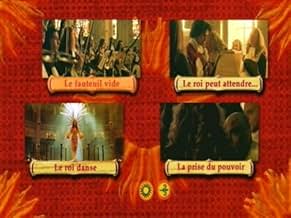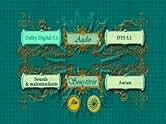Agrega una trama en tu idiomaCorbiau repeats the Farinelli formula, artistic rivalry and social private drama expressed in dazzling, sometimes excessively lavish baroque scenery, music and costume, but this time in its ... Leer todoCorbiau repeats the Farinelli formula, artistic rivalry and social private drama expressed in dazzling, sometimes excessively lavish baroque scenery, music and costume, but this time in its ultimate setting: Versailles. There are two protagonists - first the title character, Loui... Leer todoCorbiau repeats the Farinelli formula, artistic rivalry and social private drama expressed in dazzling, sometimes excessively lavish baroque scenery, music and costume, but this time in its ultimate setting: Versailles. There are two protagonists - first the title character, Louis XIV, the French sun-king who has two passions, establishing absolute rule over the realm... Leer todo
- Dirección
- Guionistas
- Elenco
- Premios
- 1 premio ganado y 5 nominaciones en total
- Prince de Conti
- (as Idwig Stephane)
Opiniones destacadas
Although a lot of famous historic characters appear (Colbert,Louvois,La Vallière,Maintenon),only five emerge :the threesome KIng/Lulli/Molière and ,at the beginning, two silhouettes ,the Queen mother,Anne d'Autriche ,and the king's cousin,Conti.
The king,played with talent by Benoit Magimel,who shows himself a first-class dancer ,is not exactly the king we find in history books:okay,he rules alone,but a lot of time is given over to arts ..in the first part of his reign,the king was first a soldier :the fine arts connoisseur came only second.(music,dance,gardens...).
Lulli (or Lully depending on whom you ask)was an Italian,so it's very surprising -and it's the main flaw of the whole film- he speaks without the slightest accent.Of course,and probably because c'est à la mode,the director doesn't pass over Lully's homosexuality but he does not lay great stress on it,preferring to give music more than its due:Lully's was majestic and magnificent,the KIng Music par excellence.
Tcheky Kario shines as Molière and gives what will probably be his lifetime role.A jaded and coughing actor/playwright/director whose genius was still brilliant,he had to cope with sanctimonious persons (les dévôts de la compagnie du Saint-Sacrement)and leter with Lully's jealousy.
The last Lully -Molière collaboration,"le bourgeois gentilhomme" (arguably Molière's funniest work),made Molière a visionary who was beginning to see theater as a complete show .The Turkish ceremony " in "le bourgeois gentilhomme" and its celebrated menuet (sadly not included in the film) were forerunners of the musicals.But Lully,who played the "Mufti" in the play ,felt like a buffoon and feared that the king might favor Molière over him.
Lully wanted to be a king and" a king ain't satisfied till he owns everything "as Bruce Springsteen sings ,so the dancer became a wolf .Molière was not his one victim :he actually put down all his rivals and had a complete stranglehold on the king's music.
Some users complain about Courbiau's baroque style:since at least one third of the time is dedicated to arts ,what's the point of being realist and austere ?We're not dealing with Rossellini directing "la prise du pouvoir par LOuis XIV",dash it! Okay ,some sequences are ponderous -Molière's death on stage while playing "le malade imaginaire" did not need this dancers dressed up as skeletons,for instance.But if cinema means change of scenery,"le roi danse" pulls it off with gusto.
I had the fortune of meeting the choreographer of the film, Béatrice Massin, who attended the screening. She is THE authority of Baroque dance in France, after having worked with Francine Lancelot, who was the pioneer in the restoration of Baroque dance into its original form. Massin works with original dance notation materials from Louis XIV's time, especially the Feuillet notations, which provided very detailed and exact instructions on the dance steps used at Louis XIV's court. This dance form is very important because it is the origin of today's ballet, which has gone through a lot of transformations, especially from that of a male-only art form to one where the female dancer dominates the stage.
During production, Massin worked with the lead roles in the movie every day for three months, and she has high regard for Benoît Magimel. Though not a professional dancer, he attempted all the dance sequences with courage, never uttering the words "I can't." Of course, the repertoire of Baroque dance was wide-ranging and Massin could not possibly have included all the varieties of that era. She mainly worked in such a way to show what the director wanted. In the context of this movie, the director had wanted to show the masculine power that the king wanted to demonstrate, as a way to consolidate his power on the throne. So what we see in the movie comes across as very forceful, masculine movements.
One thing that the film has left out - what Massin feels as a mistake - is the character of Pierre Beauchamps. Beauchamps was the key dance master at Louis XIV's court and was responsible for dance education and choreographer, although he was also a musician - not as accomplished as Lully at that, while Lully's dancing skills would pale alongside Beauchamps'. In fact, Lully, Beauchamps and Molière were working very closely together. For me, it is a big, big regret that this movie, whose theme is Louis XIV's passion and talent for dance, has treated Beauchamps in such a dismissive manner (the only scene where he appeared was when the king asked him to leave the room and rearrange the choreography, to give it "more air!").
Another thing that I miss seeing is the establishment of l'Académie Royale de la Dance. Surely, the film shows that the king announced it in a royal decree as soon as he took over all the power upon Mazarin's death. But it would have been nice to see a snippet of the academy's activities, such as how the first group of professional ballet dancers were trained.
Unlike what some of the commentators here have said, though, I think that the film does have a deep aspect. The idea that Louis XIV cared so much about the art of dance and music and Lully's concept of music being something to make the king immortal -- points to the transcending nature of these arts. Although dance and music was used as much as a political tool for power as a form of entertainment at the court, I personally feel that the passion for dance and music - as a pure form of truth and beauty - is powerfully expressed through the dramatic performances of the actors and actresses in this film.
Anybody who loves the subject of Louis XIV, Baroque music, dance and ballet should go and see this film.
¿Sabías que…?
- TriviaThe small violin Lully plays when conducting the orchestra is called a 'pochette', so called because it could be carried in a coat pocket.
- ConexionesFeatured in L'aventure humaine: La véritable histoire de d'Artagnan (2021)
- Bandas sonorasTe Deums: Symphonie
Written by Jean-Baptiste Lully
Conducted by Reinhard Goebel
Performed by Musica Antiqua Köln
Selecciones populares
- How long is The King Is Dancing?Con tecnología de Alexa
Detalles
- Fecha de lanzamiento
- Países de origen
- Sitios oficiales
- Idioma
- También se conoce como
- The King Is Dancing
- Locaciones de filmación
- Productoras
- Ver más créditos de la compañía en IMDbPro
Taquilla
- Presupuesto
- USD 21,000,000 (estimado)
- Total a nivel mundial
- USD 3,203
- Tiempo de ejecución1 hora 55 minutos
- Color
- Mezcla de sonido
- Relación de aspecto
- 2.35 : 1
Contribuir a esta página




























